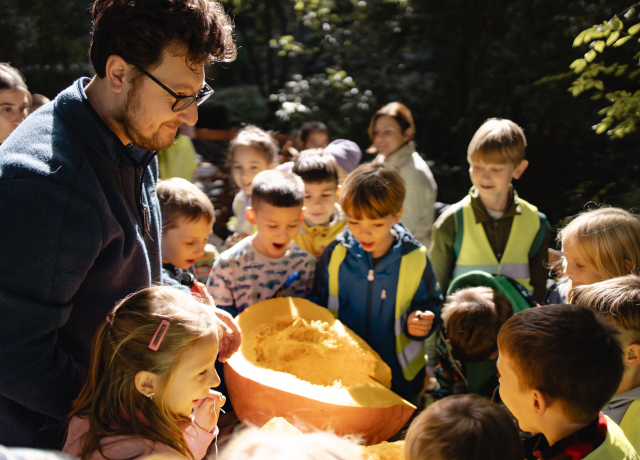European Heritage Days Article:
The Benefits of Urban Gardening in Lviv Highlighted with Grant from EHD Stories
European Heritage Days Article:
The Benefits of Urban Gardening in Lviv Highlighted with Grant from EHD Stories
Rozsadnyk space, Lviv - Credits: Lviv Tourism Office
In 2024, one of the European Heritage Days Stories awarded a grant was for a project about the history, modern-day role and benefits of urban gardening in the Ukrainian city of Lviv.
The European Heritage Days Story
This European Heritage Days Story described the history of urban gardening in Lviv, particularly focusing on the significance of vegetable growing. It described the decline of vegetable gardens in the city since the 19th century before explaining the renewed interest in urban gardening and adaptations made in the 21st century, as seen by examples such as the Rozsadnyk space; a community garden in one of the city’s public parks supporting environmental education and gardening therapy.
The key goals of the awarded project
The grant from European Heritage Days Stories was used for a project to demonstrate the importance of gardening in Lviv; highlighting personal stories and engaging the community through a series of events and documentary videos. As well as contextualising the history of horticulture as part of the city’s cultural heritage, it also aimed to reflect on the function of urban gardens in modern times through a collaborative project between The Lviv Tourism Office, the City Museum and the climate policy focused NGO, Plato. To do this, the ‘Urban Gardening: Harvest Time in the City’ project focused on a range of benefits associated with gardening, from those relating to traditions, to issues of ecological sustainability, food security and healthy eating, while also promoting the potential of nature therapy to provide positive effects for mental health. The project also aimed to strengthen communities by reaching a range of audiences from kindergarten children through to older adults and highlighting how shared urban spaces can support social cohesion and neighbourliness.
Producing a series of videos
Rozsadnyk space, Lviv - Credits: Lviv Tourism Office
As part of the project output a series of four videos was produced. Informed by research about the history of urban gardening, the first two videos examine the impact of agriculture on the development of Lviv from the middle-ages through to the city’s 19th and 20th century expansion and development. Another video titled ‘Closer to Nature’ particularly explores the impact of gardening on the environment, the importance of shared gardening spaces and ways of including areas to grow plants as part of modern architectural plans such as terraces as a vertical solution to space. A final video looks at the work of the Rozsadnyk space in Zalizna Voda Park and also highlights the impact of gardening in a variety of other community spaces, such as supporting the mental wellbeing of displaced people, providing education for children and the potential to use locally produced ingredients. Alongside commentary by historians and gardening experts, personal stories are also seen throughout the videos with vegetable garden owners discussing their experiences of growing plants such as herbs, salads, vegetables and fruit trees in the spaces between buildings.
Holding themed gardening events
Another aspect of the project was about engaging residents in gardening activities, seeing over 150 people taking part in a series of eight themed events from August to October 2024. Aiming to engage participants through different event formats, the benefits of nature for the mental health and emotional well-being of participants was the key goal of therapeutic gardening classes. Sustainability was another core topic, with workshops considering the importance of the city’s gardens in the context of climate change, while an Urban Gardening Club session was held about the value of organic waste for composting. Other events particularly focused on youth audiences, with participatory training sessions about green leadership bringing together young people to learn about local environmental challenges, while a bingo-style quest game engaged children aged 6-11 to find natural materials and research the biodiversity of gardens through play.
Project feedback and future development
Feedback from those at the events expressed interest in attending future activities, noting the friendly atmosphere and positive impressions of the venue and expertise of organisers, while the videos created for the project were viewed a combined 40,000 times in the six months following their release in April 2025. Further events were planned to take place during European Heritage Days such as tours of historic gardens and greenhouses in the city which featured in the project videos, while longer term plans include creating a map of Lviv’s vegetable gardens including information, history and personal narratives. In the meantime, the videos can be viewed online with organisers particularly hoping to support research by scholars and local historians as well as anyone interested in urban gardening across Europe.
The project videos can be watched online on the City Museum’s YouTube channel, and the work of the Rozsadnyk space can be followed on social media including Facebook and Instagram.
